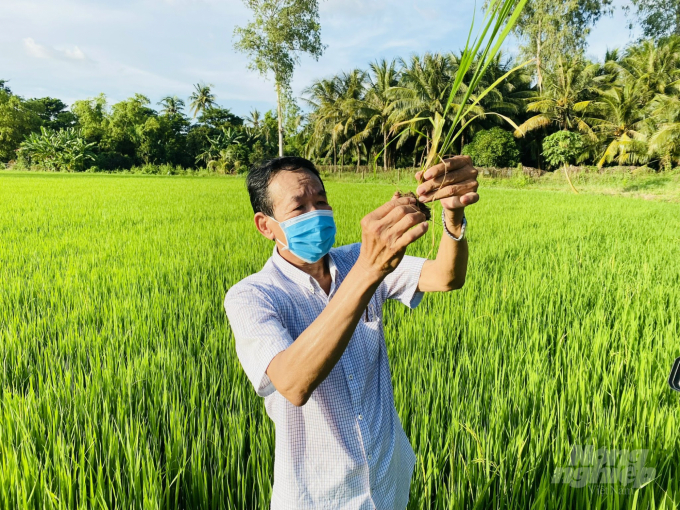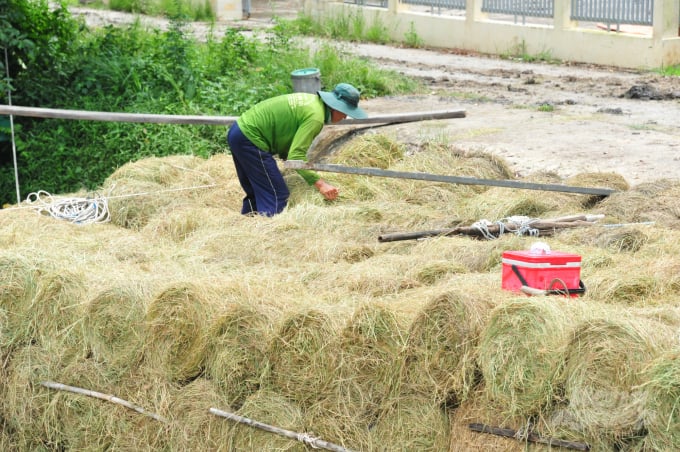November 27, 2025 | 19:11 GMT +7
November 27, 2025 | 19:11 GMT +7
Hotline: 0913.378.918
November 27, 2025 | 19:11 GMT +7
Hotline: 0913.378.918
Normally after a harvest, rice fields in the Mekong Delta are covered with straws. People gather a part of it to create straw mushrooms, and the rest are burnt to ash. It is not only considered wasteful but also a negative influence on environment and production efficiency in the next crops.

Mr. Huynh Trung Thu in Da Phuoc commune, An Phu district (An Giang) uses Emuniv probiotics to treat rice straw right in the field to help create a source of organic fertilizer serving as good nourishment for rice. Photo: Le Hoang Vu.
Burning straw right in the field equals killing beneficial microorganisms, breaking the balance of the ecosystem in the field due to the crop interval period being short. In this case, the straw does not decompose in time to provide nutrients for the plant, and the organic decomposition is not thorough. When the ash meets the sun, it creates toxic substances such as H2S and CH4, resulting in rice plants suffering organic poisoning. Organically poisoned rice plants due to the prolonged decomposition of straw after inclusion often grow and develop poorly.
Through the support and guidance of local units, businesses and specialized agencies in the agriculture sector, farmers have applied probiotics to treat rice straw, creating a source of organic fertilizer to serve rice production, greatly reducing the use of inorganic fertilizers and pesticides.
Especially in recent years the Center for Organic Agriculture (Vietnam National University of Agriculture) has researched and conducted technology transfer for the in-field straw treatment model using Emuniv probiotics. The model proves to be very effective in provinces and cities nationwide. Emuniv helps to quickly break down rice straw into humus, counter organic poisoning, balance soil pH, improve microflora, inhibit and eliminate fungal diseases in the soil.
The model also helps to limit the abuse of chemical fertilizers, pesticides and utilizes available organic resources in the field to improve the soil, rice plants’ growth and final product quality.
Over the past four years, Mr. Huynh Trung Thu in Da Phuoc commune, An Phu district (An Giang) with the support and guidance of the Center for Organic Agriculture has used Emuniv to treat rice straw which helps to create a stable organic fertilizer source to nourish the rice plants. Through nine crops deployed on an area of approximately 15ha of rice, the results are positive. Now farmers are able to drastically reduce the amount of inorganic fertilizers used from over 500 kg/ha down to only 350 kg/ha.

In addition to processing to make organic fertilizer, straw is a great resource that can be used as fodder for livestock and as a mushroom. Photo: Le Hoang Vu.
Mr. Thu said, “Before sowing the 2021-2022 winter-spring rice crop, the first thing I did was to treat rice straw in the field with Emuniv and sow the seeds using a cluster seeding machine for a density of only 60 kg/ha. The amount of NPK fertilizer applied is 350 kg/ha. I have reduced pesticide usage by 50% in particular, only sprayed twice to moderately prevent pests and diseases. The rice variety DT08 I use has been growing well so far. In my calculation, the crop can be harvested after 20 days.”
According to Mr. Thu, for fields that have straws treated with probiotics, farmers can clearly see during the growing season that this source of organic fertilizer is well-suited for rice production. It vividly reduces the amount of fertilizers and pesticides by 30-50%. The rice is always green of life and has beautiful yellow-lemon leaves.

Emuniv can be applied for 5-7kg per ha. Mix it with powdered soil, sprinkle on straw in the drained field, use machine to bury the straw in the mud, leave the field exposed. After ten days the field will be ready for sowing. Photo: Le Hoang Vu.
Fertilizer and pesticide costs account for a large proportion of rice production costs especially in the context of the constant increase in input prices. Therefore proactively implementing organic solutions to reduce the use of chemical fertilizers and pesticides in rice production is very important to secure profits for farmers while making a great contribution to environment protection.
Mr. Nguyen Van Tuong, Head of Crop Production and Plant Protection Station of An Phu
Translated by Samuel Pham

(VAN) According to Mr. Vo Minh Thanh, Director of the Tay Ninh Department of Agriculture and Environment, Resolution 57 has created a new development pathway for the locality, shifting from traditional toward modern agriculture.
/2025/11/26/4909-2-154329_878.jpg)
(VAN) Pearl grouper farming in HDPE cages not only delivers economic efficiency but also contributes to protecting the environment, creating jobs, and promoting marine-based experiential tourism.

(VAN) The model of making a living under the forest canopy through the agroforestry system in Van Son commune, Bac Ninh province, is expected to generate an annual income of approximately VND 30 million/ha.

(VAN) Many enterprises in Can Tho are harnessing natural energy and reducing greenhouse gas emissions in their production processes, thereby contributing to the promotion of a sustainable green transition.
/2025/11/24/3536-2-112800_176.jpg)
(VAN) Dong Nai now has tens of thousands of hectares of forests certified for sustainable management, and this area will continue to be expanded in the coming period.

(VAN) Vinh Ha hamlet (Dai Xuyen commune, Hanoi) is shifting away from small-scale farming as households adopt bioscurity into their breeder chicken models.

(VAN) Heavy rains make aquatic species more vulnerable to disease. Proactive water management and high-tech systems help farmers prevent outbreaks and protect yields.